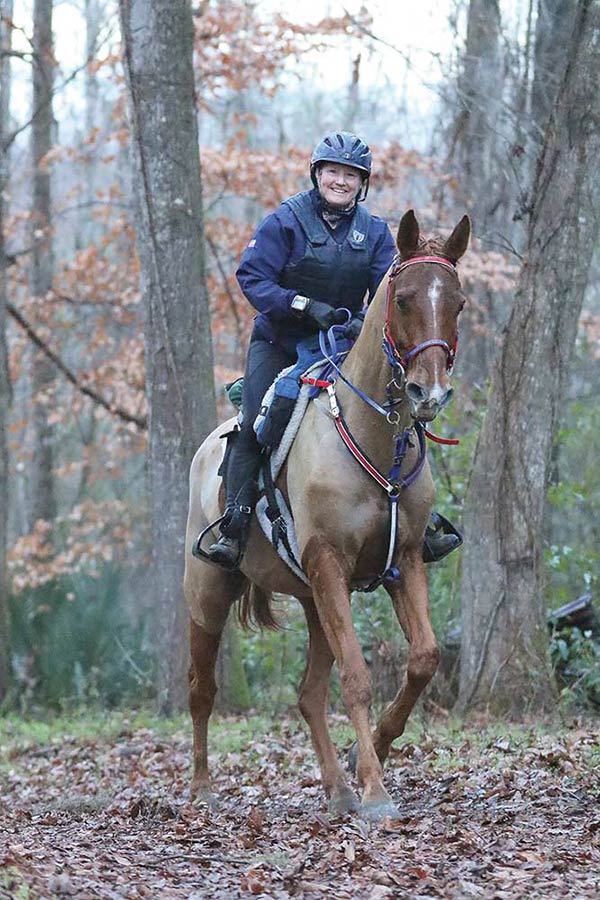
Grit. It’s a buzzword, thanks to the work of Angela Duckworth, a Professor of Psychology at the University of Pennsylvania and prolific author, writer, podcaster and advocate for children. Her book, Grit, the Power of Passion and Perseverance, was a New York Times best-seller. In her research into what makes some people successful, while others are not, she has identified common traits shared by people with grit. Guess what! It’s not magic!
From the most innovative titans of business to the youngster who wins the Spelling Bee, markers of grit abound. People with grit are interested—genuinely and passionately interested—in what they’re trying to achieve. They practice, practice, practice. They have purpose—a belief that what they’re doing has meaning. And they have hope, the recognition that setbacks are inevitable, but success is possible.
Holly Corcoran of Effort, PA checks all the boxes for grit, and does it with grace and humility. Besides being a world-class endurance rider, Corcoran is a mentor to young riders just taking up the sport. She’s a successful businesswoman, who links her business success to the work and attention and passion she invests in her sport.
When Hope Hits a Roadblock
Corcoran and Hanna Weightman, one of the young riders she has mentored, were selected for the United States team competing in the Longines Fédération Équestre Internationale, (FEI) Endurance World Championship in San Rossore, Italy in May. She planned to ride her 14-year-old Arabian Poete, and Weightman would be riding Poete’s 3/4 sibling, 10-year-old Poetrie.
Just like the best laid plans, things went awry before Corcoran and Weightman left for Italy. “I had to pull Poetrie about a week in advance because she came up lame,” Corcoran explains. She had delayed farrier work as long as possible, “and we did a training ride and she tweaked herself.”
Weightman, with no horse to ride, accompanied Corcoran to Italy as crew. Poete was shipped from Florida to the Netherlands, then taken by van to an off-site stable near the venue in San Rossore. And there things began to unravel. Ultimately, the United States Equestrian Federation (USEF) decided to withdraw the United States team from the competition.
Earlier in the spring, Europe began experiencing an outbreak of Equine Herpesvirus, EHV-1, a highly transmissible, dangerous virus. Prior to the May event, numerous European competitions had been canceled because of the spread of the virus. “Going over there, we had COVID, but also EHV concerns,” Corcoran says. “My horse was actually the one that got sick,” she says. “He got a fever, and we were able to get it down with banamine.” But the fever came back 12 hours later. In that brief window, Corcoran thought it was still possible for her to compete. “He was acting painful and uncomfortable when the fever came back,” she says. “The bloodwork was more indicative of bacterial than viral.” Still, the threat of EHV-1 hung in the air like a nagging question for which there would be no answer.
“We were still in the offsite stables when this was discovered,” she says. “So we said ‘okay, let’s just isolate my horse and the others can compete.’” In the meantime, they did the nasal swabs, and one of the people on Corcoran’s crew drove the samples to the lab, which was four hours away. The lab results didn’t come back until race day, and her horse was negative for EHV-1.
“Before that happened, I knew I had to withdraw because my horse was sick,” she says. “I had made that decision. I was devastated,” she says. She felt badly for her horse, and for the other members of the team.
Duckworth describes hope as “a rising to the occasion kind of perseverance.” In the midst of the ruins of what had promised to be an extraordinary adventure, Corcoran and her teammates found their endurance tested unimaginably. There would be no FEI Endurance World Championship for the team.
From Roadblock to Opportunity
They regrouped and considered a different opportunity. “We decided we were going to do a ride a week later, a test event which is a qualifier for 2022.” The test event was in Isola della Scala, near Verona. They summoned their hope, their resilience, and their sense of purpose, and invested it in a different competition, about 300 km from San Rossore.
“We went to Verona and I was able to employ some of the strategy I wanted to use at the championship. It was validating, because the things I anticipated, happened.” In the last loop of the event, Corcoran noticed that Poete seemed uncomfortable, so she got off and withdrew him. Although she and Poete withdrew, she was thrilled for Jeremy Reynolds, another member of the team, who won the 160 km competition. Weightman flew home before the team went to Verona.
Resilience, Grace and Endurance
Corcoran isn’t sure what’s next. “It was really tough,” she says. “I came back and I was really, really down. But I had to kind of figure out ‘what does this mean?’” Will there be another attempt at the World Championship? She says she is taking one step at a time, and Poete is fine. She’s planning to take him for another 100-mile event in September. “There’s so much that I learned,” she says. “and I wonder if I want to apply it. He is my heart horse and I was really proud of him. Everything we faced, he was just a good boy and when we got to the test event, with all the crowds and the music, he just stood there like the consummate professional.”




